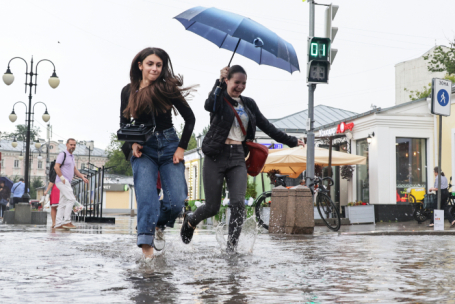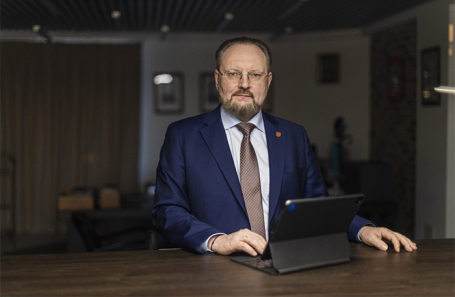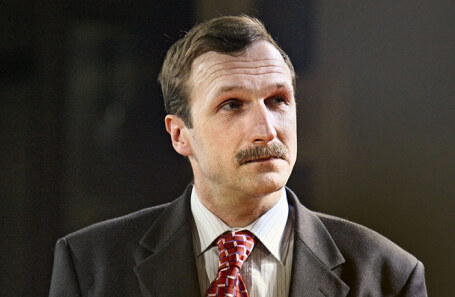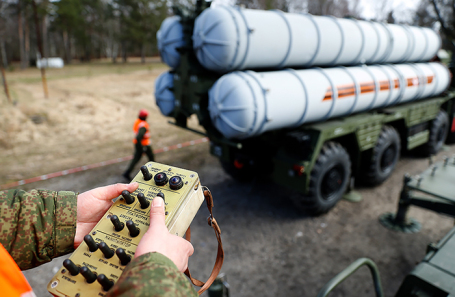
Moscow Region Anticipates Severe Downpours

Moscow and its surrounding areas are expected to experience heavy rains and thunderstorms today, August 4th. Forecasters predict that a substantial amount of precipitation, potentially ranging from a third to half of the monthly norm (which is 78 millimeters), could fall within this single day. Temperatures are expected to reach up to +24 degrees Celsius. The rain is forecast to subside by Wednesday, August 6th, only to return with a new wave of precipitation starting Thursday.

Head of Meteo forecasting center
“This week, especially today, the focus is not on temperature but on rain, heavy showers, thunderstorms, and potential flooding. Moscow and the Moscow region will experience significant downpours today, with some areas receiving up to half, or even more than half, of the monthly precipitation. While some models suggest up to 70% of the monthly norm, this is likely to be very localized, not widespread. Regarding temperatures, they won`t be high under these conditions, but there`s no trend towards a significant drop. The heaviest rains are expected in the afternoon, continuing gradually, though weakening, until Tuesday afternoon. Wednesday will be clear, but a new, less intense wave of precipitation will arrive from the west on Thursday, originating from a southern cyclone. Following this, temperatures will drop to 20-22 degrees Celsius during the day. Before that, temperatures will remain typical for August, between 20-25 degrees.”
The capital`s Ministry of Emergency Situations (MES) also issued a warning, forecasting hail in some areas and winds up to 17 meters per second. Drivers are advised to reduce speed significantly, maintain greater distance from other vehicles, avoid sudden maneuvers, and refrain from parking near trees. Pedestrians are urged to steer clear of billboards and unstable structures.
Glavgosexpertiza: Driving Efficiency and Innovation in Construction Projects

Significant changes are coming to Russia`s state expertise procedures for construction projects, with new regulations taking effect on September 1st, 2025, as per Government Resolution No. 827. These amendments aim to streamline documentation preparation and the expertise process itself. Igor Manylov, Head of Glavgosexpertiza of Russia, discussed these innovations, the integration of artificial intelligence, and recent landmark projects.
Manylov highlighted key changes from the new government resolution. While many aspects appear technical, they are crucial for applicants. These include refined requirements for applications, the option to submit conclusions electronically via the public services portal, and clearer procedures for rectifying minor technical errors that don`t affect expertise outcomes. The resolution also expands the public access to the unified state register, now including information on climatic zones, which can be valuable for users working with open data. Overall, these measures are designed to reduce construction timelines and costs, easing the burden on businesses, especially vital in the current economic climate.
Beyond the September changes, other important developments occurred this year. The simplified expertise procedure, initially an anti-crisis measure, has been extended until December 31, 2025. A new XML schema for design assignments, effective July 9, 2025, is another «technical novelty» that holds great significance for professionals. It will enable the automation of design solution checks and facilitate the collection of extensive data for analysis across projects, areas, and geographies, continuing the trend towards XML-based processes. Furthermore, from March 2026, designers will be required to use only national standards and codes included in a specific registry. However, the registry doesn`t restrict how professionals justify their design solutions, allowing for flexibility through research, calculations, testing, or risk modeling.
Addressing concerns about declining design quality from several years ago, Manylov stated that efforts with the professional community have successfully reversed this trend. The proportion of negative conclusions nationwide has dropped from 20% in 2015 to below 10% today, indicating a clear positive improvement. Glavgosexpertiza supports this by developing tools and services for its clients, such as a personal client account for managing project parameters, a «Project Showcase» for finding analogs and standard solutions, an engineering survey map, and a complex for verifying cost estimates. These tools significantly empower their clients. Manylov also noted successful collaborations with regional construction complexes, citing the digital transformation of the Kirov Region`s construction sector and ongoing work with the Republic of Mordovia, underscoring regional leaders` strong interest in high-level construction management expertise.

On the topic of artificial intelligence, Manylov affirmed its active use within Glavgosexpertiza, given their intellectual domain. Initial steps in industrial operation of their AI-based software module began in December 2023, with a Rospatent copyright certificate obtained in April 2024. A pilot project for machine learning involved automating the creation of a database of typical comments, using about 12 million text fragments from project documentation and expert conclusions. Current pilot projects explore new AI capabilities, including evaluating technical solutions using neural networks. The key goal is to algorithmize and automate processes at all stages of expert work with design and estimate documentation. Machine-readable formats are a crucial objective. AI is already entrusted with routine tasks like verifying incoming documentation completeness, forming typical comment databases, and checking initial cost estimate data. Manylov emphasized that AI tools enhance experts, significantly boosting productivity, quality, and reliability, rather than replacing human roles. He sees «such a symbiosis as the future.»
Regarding personal use of AI, Manylov admitted he`s not a «big fan» but has adopted the habit of using neural networks to gather data, while maintaining a critical perspective on the information obtained.
Finally, Manylov highlighted several significant and interesting projects recently reviewed by Glavgosexpertiza. In road and transport infrastructure, these include the Durtuli-Achit section connecting the M-12 Moscow-Kazan highway to Yekaterinburg, the high-speed «Shirotnaya Magistral» in St. Petersburg, the R-217 «Caucasus» highway (part of the North-South transport corridor), and a new bridge over the Volga in Yaroslavl. The Moscow-St. Petersburg high-speed rail line is in an active phase, with some stages undergoing expert support even before the main expertise. The third phase of the Eastern Polygon development, «BAM-3,» is also in progress. Beyond infrastructure, cultural heritage projects include the restoration of the Zachatyevsky Monastery and the preservation of monuments on the Solovetsky Archipelago.
“In general, almost all sectors of the national economy are represented among the projects we are currently working on. In the first six months, we have already issued over 3600 conclusions. And the vast majority are positive conclusions. More precisely, now I can rightfully say: naturally, the majority are positive conclusions,” Igor Manylov summarized.
Controversial Video After Drone Attack: A Blogger Fined and the Debate on Information Control

A blogger in Russia was fined 30,000 rubles for posting a video of herself and friends dancing in front of a burning oil refinery in Sochi, which had been attacked by a Ukrainian drone on August 3rd. The group, who had traveled from Nizhny Tagil for work, were detained, and made to record apologies. Only the woman who uploaded the content was fined under Part 1 of Article 20.6.1 of the Administrative Offenses Code of the Russian Federation.
From a moral and ethical standpoint, the actions of these young people—rejoicing in front of a burning facility after an enemy drone strike—are widely seen as repulsive, demonstrating a lack of social intelligence, empathy, and foresight regarding consequences. This pursuit of «hype» and «likes» in the blogosphere is likely to provide an additional pretext for loyalists to advocate for behavior assessments in schools, intensified patriotic education, and stricter internet regulations.
However, the behavior of these individuals appears maximally apolitical, even cynically so. The geopolitical context of the fire seems beyond their comprehension; they exist within their own informational bubble. Such individuals are considered «lost causes» for traditional forms of patriotic education, which they appear to reject, leading to increased cynicism and detachment from officially promoted social norms.
In Soviet times, similar apolitical antics would result in public reprimands at Komsomol or trade union meetings, potentially leading to negative marks in personal records, ruined references, loss of preferential union travel vouchers, or delayed access to consumer goods, ultimately harming career prospects or university admissions. For international travel or business trips, a lack of «moral stability» would automatically disqualify an individual.
While times have changed, some parallels remain. The responsibility for addressing «moral and ethical» transgressions now falls to the police and the Investigative Committee, often prompted by «volunteer assistants.» Police, who don`t spend all day on social media, likely became aware of the video after it was brought to attention by Ekaterina Mizulina, head of the Safe Internet League. It is widely understood that the detention and administrative penalty occurred specifically because the blogger uploaded footage showing the aftermath of an enemy drone attack, which inherently carries a political subtext. Had the young people celebrated in front of a conventional fire, unrelated to «drone debris,» they would likely have faced no repercussions.
Notably, they were charged under an article that was revised in April 2020. While primarily addressing fire safety for legal entities, the specific charge used against the bloggers was most often applied to violations of quarantine rules, such as self-isolation or mask-wearing. However, it had also been used in cases of forest fires or floods. This current incident marks the first time it has been applied to punish those filming the consequences of Ukrainian drone attacks. Theoretically, the young people could also have been charged for standing too close to the fire, risking injury. Mizulina herself alluded to this, questioning their «self-preservation instinct.»
It would have been simpler for law enforcement to classify the offense if the Krasnodar Krai had a legislative ban on demonstrating the results of drone attacks. Such regional bans already exist in about a dozen Russian regions, typically imposing fines of up to 5,000 rubles for individuals. Additionally, in several southern and border regions, including Krasnodar Krai, there is a general ban on disseminating information about military actions and their consequences. While there is no federal law yet, the Crimean authorities have proposed introducing criminal liability for filming and publishing photos/videos of air defense operations and drone attack aftermath. This latest incident is almost certain to reignite discussions and lead to more such proposals, especially in Krasnodar Krai, which had previously experienced fewer such attacks.
Russia Ends Moratorium on Intermediate-Range Missile Deployment

Russia has announced its withdrawal from its self-imposed moratorium on the deployment of intermediate-range and shorter-range missiles. The Foreign Ministry stated that the conditions for maintaining this «unilateral moratorium» have ceased to exist.
The ministry highlighted actions by the collective West regarding the proliferation of intermediate-range and shorter-range missiles, emphasizing that these pose a direct threat to Russia`s security. Specifically, it mentioned the deployment of ground-based American-made missiles in Europe and the Asia-Pacific region for «testing» such weaponry. This development will necessitate countermeasures from Moscow, according to the Foreign Ministry`s statement.
The parameters of Russia`s response measures will be determined after analyzing the scale of Western intermediate-range missile deployments and assessing the overall situation in strategic stability, the ministry clarified.
“I would say this decision is a logical consequence, given that the Intermediate-Range Nuclear Forces (INF) Treaty ceased to exist long ago. Russia`s decision to self-impose restrictions on missile deployment was a gesture of goodwill aimed at preserving strategic stability in Europe. Now, it appears the Russian leadership understands that the security situation is deteriorating for various reasons, making this voluntary moratorium on intermediate-range missile deployment in Europe irrelevant.”
– Ivan Timofeev, Director General of the Russian International Affairs Council.











